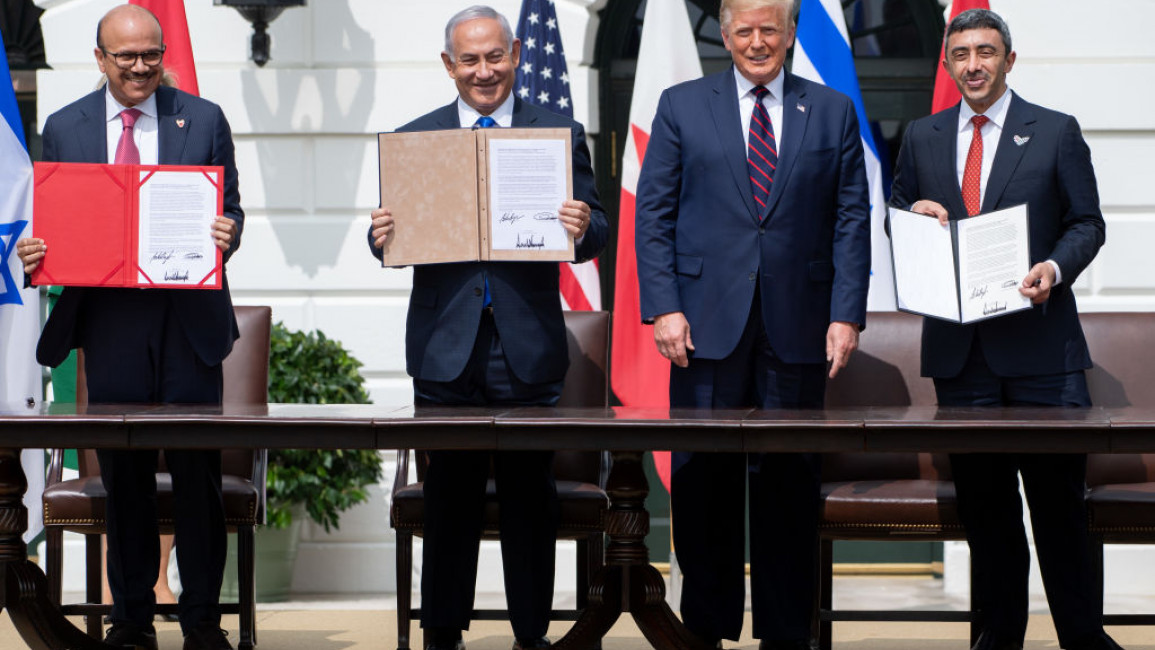US to 'celebrate' Abraham Accords anniversary with Arab, Israeli leaders
US Secretary of State Anthony Blinken will hold a virtual meeting on Friday with representatives from Israel, the UAE, Bahrain and Morocco to mark the one-year anniversary of the Abraham Accords.
The “historic” agreements normalised ties between the Jewish state and Arab countries - the UAE, Bahrain, Morocco. The three countries committed to the deal on 15 September 2020.
The online event will “commemorate the one-year anniversary” of the Accords and “discuss ways to further deepen ties and build a more prosperous region,” a senior State Department official told Axios.
The Biden’s administration's public display of support for the deal is a noticeable change from their previous tepid embrace of the policy, which was inherited from predecessor President Donald Trump and widely criticised for sidelining Palestinian sovereignty over economic interests.
State Department spokesman Ned Price said in a video shared on Twitter that the administration was “thrilled to celebrate” the anniversary.
“We also hope that as Israel and other countries in the region join together in [a] common effort to build bridges and create new avenues for dialogue and exchange, we’re able to make tangible progress toward the goal of advancing a negotiated peace between Israelis and Palestinians,” he said.
We’re heralding the one-year anniversary of the signing of the #AbrahamAccords between Israel and the United Arab Emirates & Israel and the Kingdom of Bahrain as well as the later agreement between Israel and the Kingdom of Morocco to normalize relations. Mazel Tov & Mabrouk! pic.twitter.com/PBavZG63q2
— Ned Price (@StateDeptSpox) September 14, 2021
The UAE and Bahrain, the first countries in over 20 years to sign a peace deal with Israel after Jordan and Egypt, have established numerous diplomatic and trade links with the Jewish state. The UAE in particular now enjoys multimillion dollars worth of trade with Israel and has exchanged official ambassadors.
Morocco has also traded envoys. Meanwhile, the White House is working on a deal between Sudan and Israel according to Biden’s National Security Council director for the Middle East Barbara Leaf last month.
In order to maintain the peace, the Biden administration upheld a Trump-brokered deal to sell F-35 fighter jets to the UAE and maintained the previous administration’s recognition of Moroccan sovereignty in Western Sahara.
The Abraham Accords “provided a transformative, positive lens through which we can all now look at what is sometimes a challenge region,” said Democratic Representative Ted Deutch at an event on Monday “assessing the impact” of the Accords, hosted by US-based policy forum the Wilson Centre.
Want to know more about the Abraham Accords one year later, and what lies ahead?
— The Wilson Center (@TheWilsonCenter) September 15, 2021
Our experts provide their insight: https://t.co/Sgea7bYlkn
Israel’s Ambassador to the US and UN Gilad Erdan, who also attended Monday’s event said: “It’s a little like a marriage, you have the big wedding party, you make vows to one another. But the real test of any marriage is what happens next when the cameras are off.
“I’m glad to say that, one year later, it is clear, these agreements have gone well beyond their important symbolism.”
Yousef Al-Otaiba, Ambassador from the UAE to the US said: “I think we salvaged the two-state solution”, arguing that the Accords still served to protect the Palestinian people.
However, not everyone agrees.
Following the fighting in the besieged Gaza Strip in May between Israel and Hamas - in which more than 260 Palestinians were killed - the UAE, Bahrain and Morocco offered mild calls for de-escalation without redressing the normalisation agreements to ensure the protection of Palestinian rights.
“Arab-Israeli relations and the Israeli-Palestinian conflict are now on sharply divergent trajectories,” wrote Jeremy Pressman, Professor of Political Science and Director of Middle East Studies at the University of Connecticut for Foreign Affairs.
“Regional diplomacy has left the situation in Palestinian no closer to a peaceful resolution than it was before normalization began.”
The scholar stressed that the fate of Palestinians was no longer at the forefront of Arab policy, and instead economic and national interests take precedent.



